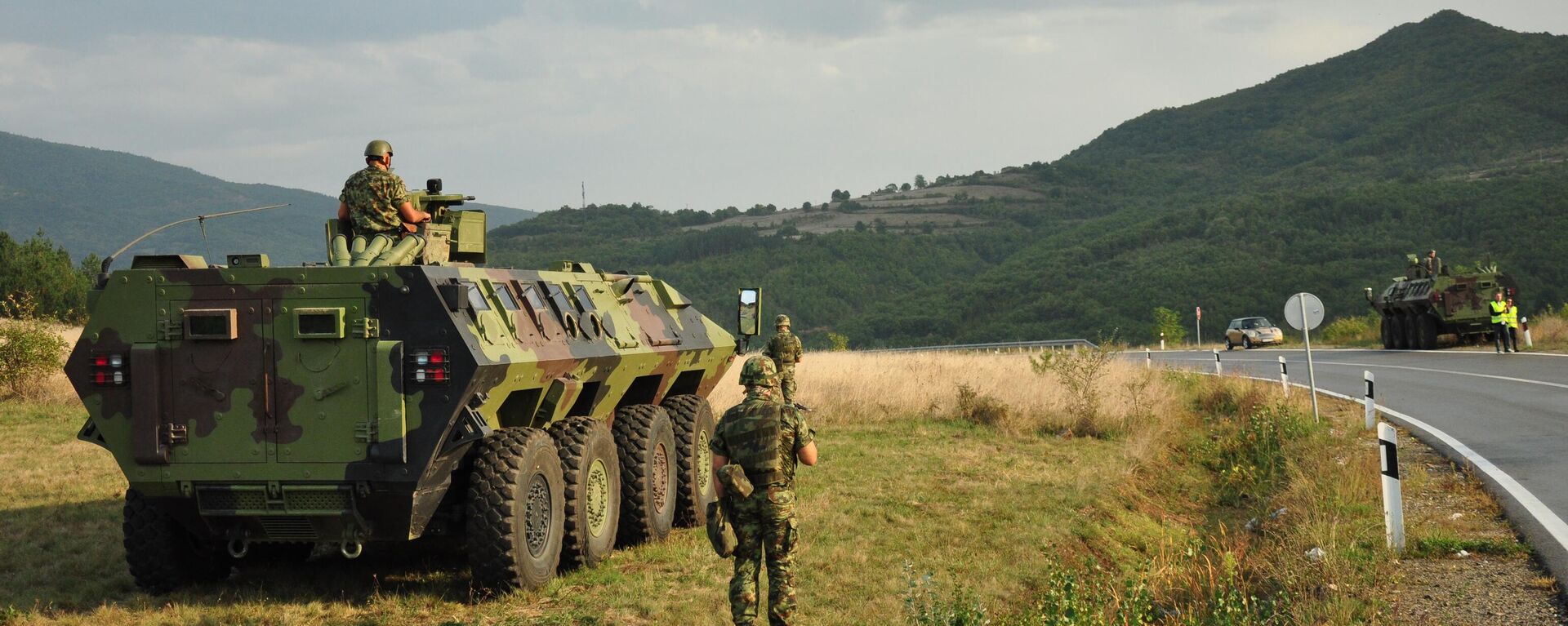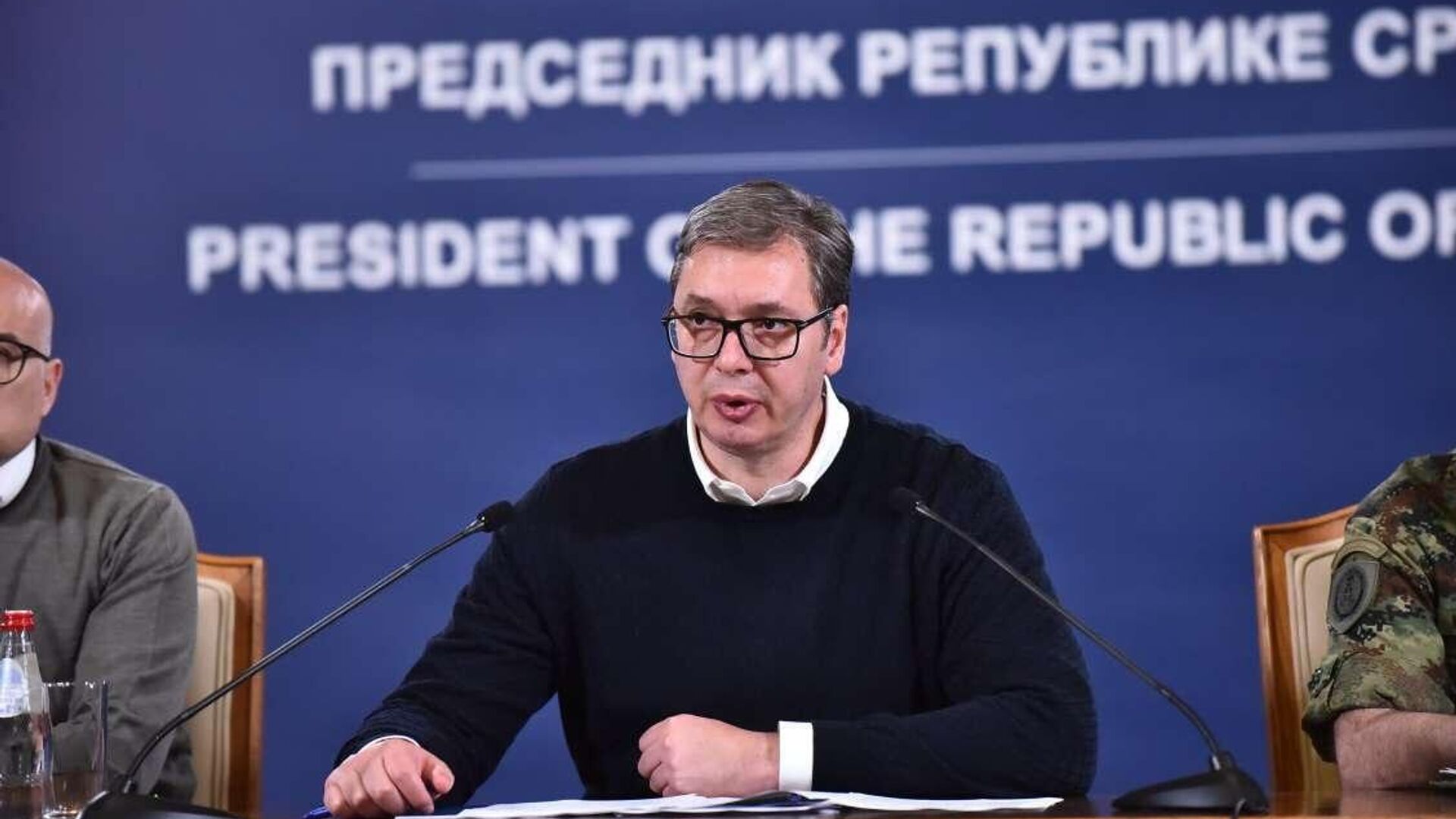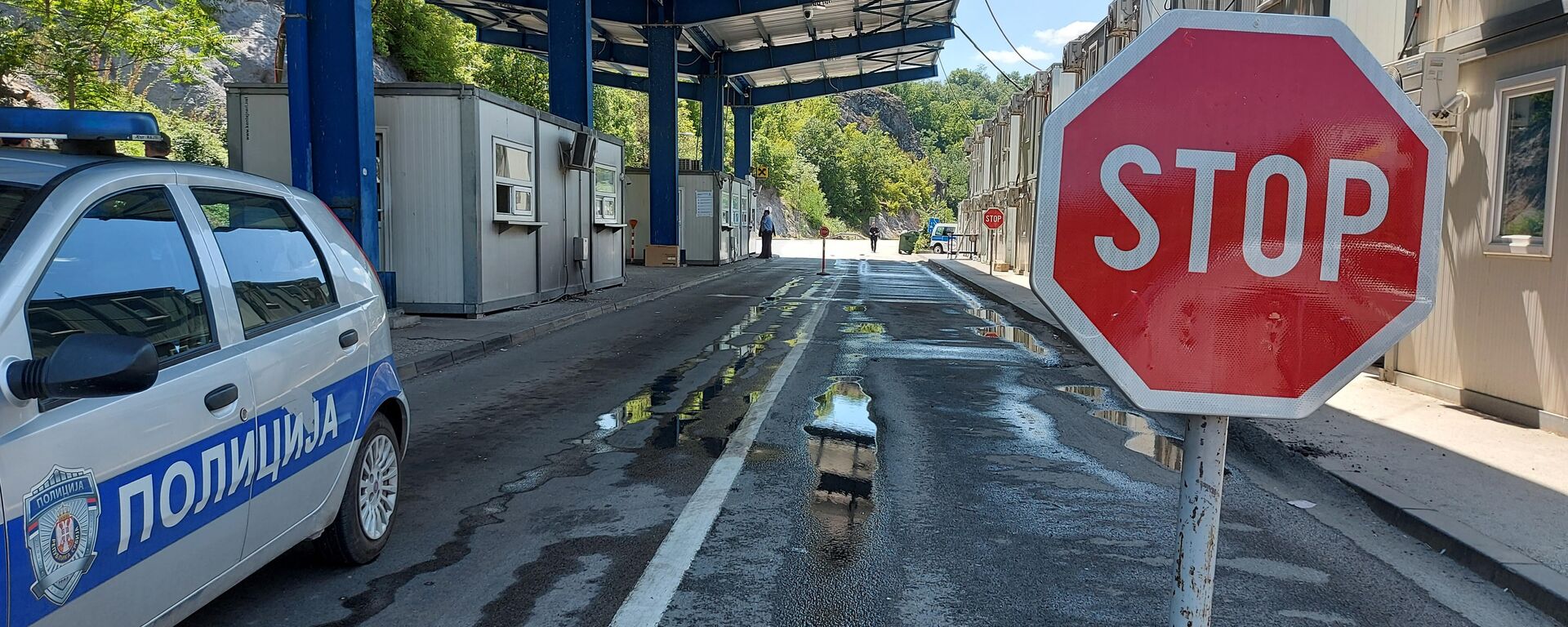https://sputnikglobe.com/20230529/serbian-president-vucic-goal-of-aggravation-of-situation-in-kosovo-is-to-clash-serbia-nato--1110780965.html
President Vucic: Goal of Aggravation in Kosovo is to Cause Clash Between Serbia and NATO
President Vucic: Goal of Aggravation in Kosovo is to Cause Clash Between Serbia and NATO
Sputnik International
The security situation in the breakaway Serbian province of Kosovo took a turn for the worse late last week after Pristina used force to try to install ethnic... 29.05.2023, Sputnik International
2023-05-29T18:27+0000
2023-05-29T18:27+0000
2023-05-29T20:24+0000
world
serbia
kosovo
nato
aleksandar vucic
https://cdn1.img.sputnikglobe.com/img/07e7/05/1d/1110780792_0:59:1128:694_1920x0_80_0_0_96610d8003c899a52c027559cd9fde2c.jpg
Self-proclaimed Kosovo prime minister Albin Kurti is interested in spreading unrest in the province's north to try to provoke a clash between Serbia and NATO, Serbian President Aleksandar Vucic has said."Over the past three days, even the politically illiterate could understand what was being prepared for us today," Vucic said, referring to Monday's localized clashes between ethnic Serb protesters in Kosovo and KFOR, or Kosovo Force, the NATO-led 'peacekeeping' force operating in the breakaway province.Vucic called on Kosovar Serbs to protest the situation in the province, but to "do it peacefully... Because then no one can defeat them. We will do our best to keep the peace."Vucic went on to detail the causes of the escalation, saying that as Serbs "from the north of Kosovo and Metohija gathered in front of the municipalities of Zvecan, Leposavic and Zubin Potok to express dissatisfaction" with Pristina's appointment of puppet mayors, they were "met with KFOR soldiers and barbed wire."According to Vucic, KFOR allowed the Kurti-appointed mayors to enter municipal buildings, and then "protected them from the Serbs," instead of protecting local Serbs from Pristina.Belgrade responded to the escalation in Kosovo by raising the army's combat readiness to its highest level.Vucic plans to monitor the situation in Kosovo from the administrative border with the breakaway Monday night, and to meet with the US, British, French, Italian and German ambassadors, as well as the head of the European Union delegation in Serbia, on Tuesday morning.Over 50 Serbs were injured in clashes with KFOR forces in the Kosovo municipality of Zvecan on Monday afternoon, with one protester suffering gunshot injuries. Some Western media have tried to shift the blame onto the demonstrators, reporting up to 41 injuries among KFOR troops, among them 11 Italians. Four Serbs were arrested in the unrest. KFOR commander Angelo Michele Ristuccia slammed protesters for their "unprovoked attacks" on KFOR forces, and assured that KFOR will "continue to impartially carry out its mandate."Moscow has condemned the violence in Kosovo, and the West's response. Speaking to reporters in Nairobi during his visit to Kenya on Monday afternoon, Russian Foreign Minister Sergei Lavrov warned that a "huge explosion may happen in the center of Europe" if tensions are not calmed. Calling the situation "alarming," Lavrov lamented that Western powers have "of course set a course for the total subjugation of everyone who somehow expresses their own opinion."Serbia's Open WoundKosovo has witnessed several rounds of escalating tensions between local ethnic Serbs and the Pristina government throughout the past year over a variety of pretexts, from measures by Pristina to force Serbs to get Kosovo-issued license plates, to a push by prime minister Kurti to expand NATO's presence in the region to "strengthen security."Tensions between Kosovar Serbs and Kosovar Albanians began growing after the collapse of the Socialist Federal Republic of Yugoslavia, and escalated into a full-fledged shooting war in the late 1990s, when ethnic Albanian militants kicked off a guerilla warfare campaign against Serbian police and the military. NATO intervened in the crisis, conducting a 78-day bombing campaign against the rump Yugoslav state between March and June 1999, and later setting up Camp Bondsteel, the largest US military base in the Balkans, in southern Kosovo. The United States and several dozen of its allies recognized Kosovo as an independent state in 2008. Belgrade never recognized Pristina's independence claims. Neither have Russia, China, India, Iran, Brazil, South Africa, Spain and dozens of other countries around the world.
https://sputnikglobe.com/20230528/current-tensions-in-kosovo-could-escalate-into-armed-conflict---serbian-defense-minister-1110656149.html
https://sputnikglobe.com/20221122/kosovo-serbias-open-wound-1104552715.html
serbia
kosovo
Sputnik International
feedback@sputniknews.com
+74956456601
MIA „Rossiya Segodnya“
2023
News
en_EN
Sputnik International
feedback@sputniknews.com
+74956456601
MIA „Rossiya Segodnya“
Sputnik International
feedback@sputniknews.com
+74956456601
MIA „Rossiya Segodnya“
serbia, kosovo, nato, aleksandar vucic
serbia, kosovo, nato, aleksandar vucic
President Vucic: Goal of Aggravation in Kosovo is to Cause Clash Between Serbia and NATO
18:27 GMT 29.05.2023 (Updated: 20:24 GMT 29.05.2023) The security situation in the breakaway Serbian province of Kosovo took a turn for the worse late last week after Pristina used force to try to install ethnic Albanian mayors in Serb-majority municipalities in the province's north after a boycott of municipal elections by local residents in April.
Self-proclaimed Kosovo prime minister Albin Kurti is interested in spreading unrest in the province's north to try to provoke a clash between Serbia and NATO, Serbian President Aleksandar Vucic has said.
"All of this was organized by Albin Kurti out of his big desire for a conflict between the Serbs and NATO. He is the solely responsible for what is happening, but washes his hands like Pontius Pilate and says this has nothing to do with him," Vucic said in an address to the nation on Monday evening.
"Over the past three days, even the politically illiterate could understand what was being prepared for us today," Vucic said, referring to Monday's localized clashes between ethnic Serb protesters in Kosovo and KFOR, or Kosovo Force, the NATO-led 'peacekeeping' force operating in the breakaway province.
Vucic called on Kosovar Serbs to protest the situation in the province, but to "do it peacefully... Because then no one can defeat them. We will do our best to keep the peace."
Vucic went on to detail the causes of the escalation, saying that as Serbs "from the north of Kosovo and Metohija gathered in front of the municipalities of Zvecan, Leposavic and Zubin Potok to express dissatisfaction" with Pristina's appointment of puppet mayors, they were "met with KFOR soldiers and barbed wire."
According to Vucic, KFOR allowed the Kurti-appointed mayors to enter municipal buildings, and then "protected them from the Serbs," instead of protecting local Serbs from Pristina.
"The Serbs proposed that KFOR should stay, that the fake mayors and Kurti's special forces should leave. But no agreement could be reached and KFOR went into action," beating protesters, throwing stun grenades and tear gas, with part of the crowd taking cover, and another part fighting back, the Serbian president said.
Belgrade responded to the escalation in Kosovo by raising the army's combat readiness to its highest level.
Vucic plans to monitor the situation in Kosovo from the administrative border with the breakaway Monday night, and to meet with the US, British, French, Italian and German ambassadors, as well as the head of the European Union delegation in Serbia, on Tuesday morning.
"I am calling on the international community for the last time to reason with Albin Kurti. If they don't, I'm afraid it will be too late. The people of Serbia must know that they have a responsible leadership, and that we will not allow for pogroms and killings of our people," Vucic stressed during Monday's address.
Over 50 Serbs were injured in clashes with KFOR forces in the Kosovo municipality of Zvecan on Monday afternoon, with one protester suffering gunshot injuries. Some Western media have
tried to shift the blame onto the demonstrators, reporting up to 41 injuries among KFOR troops, among them 11 Italians. Four Serbs were arrested in the unrest. KFOR commander Angelo Michele Ristuccia slammed protesters for their "unprovoked attacks" on KFOR forces, and assured that KFOR will "continue to impartially carry out its mandate."
Moscow has condemned the violence in Kosovo, and the West's response. Speaking to reporters in Nairobi during his visit to Kenya on Monday afternoon, Russian Foreign Minister Sergei Lavrov
warned that a "huge explosion may happen in the center of Europe" if tensions are not calmed. Calling the situation "alarming," Lavrov lamented that Western powers have "of course set a course for the total subjugation of everyone who somehow expresses their own opinion."
Kosovo has witnessed several rounds of escalating tensions between local ethnic Serbs and the Pristina government throughout the past year over a variety of pretexts, from measures by Pristina to force Serbs to get Kosovo-issued
license plates, to a
push by prime minister Kurti to expand NATO's presence in the region to "strengthen security."
Tensions between Kosovar Serbs and Kosovar Albanians began growing after the collapse of the Socialist Federal Republic of Yugoslavia, and escalated into a full-fledged shooting war in the late 1990s, when ethnic Albanian militants kicked off a guerilla warfare campaign against Serbian police and the military. NATO intervened in the crisis, conducting a 78-day bombing campaign against the rump Yugoslav state between March and June 1999, and later setting up Camp Bondsteel, the largest US military base in the Balkans, in southern Kosovo. The United States and several dozen of its allies recognized Kosovo as an independent state in 2008. Belgrade never recognized Pristina's independence claims. Neither have Russia, China, India, Iran, Brazil, South Africa, Spain and dozens of other countries around the world.

22 November 2022, 14:00 GMT




